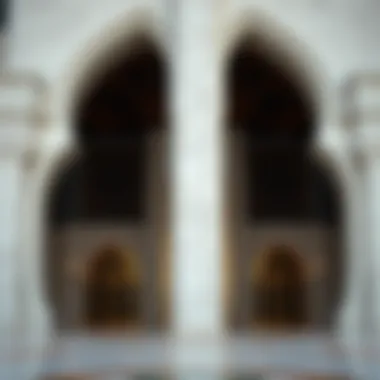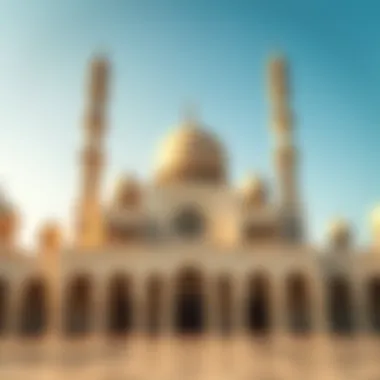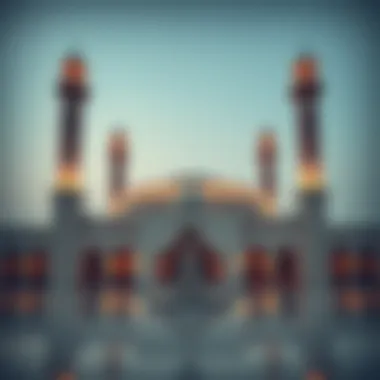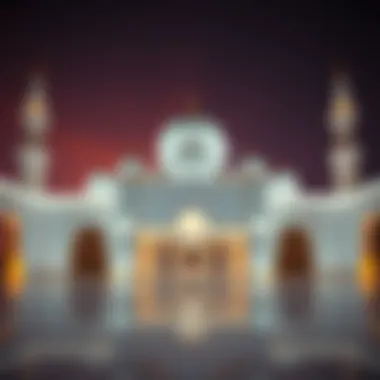Exploring the Obai Bin Kaab Mosque in Dubai


Intro
Nestled within the thriving heart of Dubai, the Obai Bin Kaab Mosque emerges as a cultural and spiritual haven. This mosque is not just a place of worship; it represents the rich history and community spirit of the region. With intricate architectural designs and a vibrant atmosphere, the mosque serves as both a landmark and a gathering place for believers and visitors alike.
The mosque stands as a testament to Dubai’s commitment to fostering an inclusive space for all. Its design incorporates elements reflective of traditional Islamic architecture while simultaneously embracing modern aesthetics. The synthesis of old and new creates an environment that feels both welcoming and reverent.
In recent years, Dubai's rapid growth has sparked interest in its cultural sites, emphasizing the importance of understanding landmarks like the Obai Bin Kaab Mosque. This exploration goes beyond aesthetics; it delves into the mosque's role in promoting social cohesion and its impact on community life. By providing insights into the mosque's historical context and relevance today, this article aims to illuminate its significance as a cultural jewel in the ever-evolving landscape of Dubai.
Historical Context of the Obai Bin Kaab Mosque
Understanding the historical context of the Obai Bin Kaab Mosque is essential for comprehending its prominence in Dubai, both as an architectural marvel and a spiritual stronghold. This mosque is not merely a building; it's a living testament to the rich tapestry of Dubai's past, interwoven with elements of religion, culture, and community life.
Origins and Founding
The origins of the Obai Bin Kaab Mosque can be traced back to the early years of Dubai's remarkable transformation from a humble fishing village into a bustling metropolis. Established in the 1970s, the mosque reflects the era's aspirations, showcasing a blend of traditional Islamic architectural motifs and practical design suited to the region's climate. It was named after Obai Bin Kaab, an early companion of the Prophet Muhammad, lending the mosque a historic and spiritual weight that resonates with worshippers and visitors alike.
The founding of this mosque was more than just placing bricks and stones; it symbolized the community's commitment to fostering a space for prayer and reflection amidst the rapid development that characterized Dubai's economic landscape. Local donations and support from the government played a significant role in setting the foundation of this spiritual haven. As such, it serves not just as a place of worship but also as a cornerstone of community identity, binding residents through shared beliefs and traditions.
Evolution Over Time
Over the years, the Obai Bin Kaab Mosque has seen various transformations to meet the needs of a diversifying population. Initially catering primarily to locals, the mosque now welcomes expatriates and tourists alike, reflecting Dubai's cosmopolitan nature. It's been renovated and updated to include modern facilities while preserving its traditional aesthetic. The balance between the old and new is key, as it embodies the mosque's adaptability to contemporary demands without losing its intrinsic character.
The introduction of educational programs and community events has been pivotal in enhancing the mosque's role. As the community grew, so did the mosque’s functions—from simple prayers to hosting lectures on Islamic values and interfaith dialogues aimed at fostering understanding among various cultures. These initiatives mark important milestones in its evolution, making the Obai Bin Kaab Mosque a crucial component of Dubai's vibrant socio-cultural landscape.
Historical Significance in Dubai
The historical significance of the Obai Bin Kaab Mosque extends beyond its founding and architectural presence. It encapsulates the ethos of Dubai's community spirit and its openness to diverse cultures. This mosque has witnessed the city's evolution firsthand, becoming a hub for community gatherings and a focal point for religious observances. Generations have come to view it not just as a place of worship but as a landmark of cultural pride and heritage.
Did you know that the mosque plays a pivotal role during significant Islamic events, such as Ramadan and Eid? Each year, it becomes a central site for communal prayers, drawing the faithful from all corners of Dubai and its neighboring regions, showcasing the strong communal bonds that it fosters.
Moreover, as a historical landmark, the Obai Bin Kaab Mosque serves as a reminder of Dubai's roots while also symbolizing its aspirations. It's a bridge between the past and the future, encouraging both residents and visitors to reflect on the rapid changes surrounding them, all while offering a peaceful sanctuary amid the city's hustle and bustle.
Ultimately, the Obai Bin Kaab Mosque stands as a beacon of spiritual and cultural significance in Dubai, inviting all who enter to connect with its profound history and the ideals it represents.
Architectural Features of the Mosque
The architectural marvel of the Obai Bin Kaab Mosque not only defines its aesthetic appeal but also reflects the harmony of spirituality and community engagement. Its architectural features can be crucial in understanding how the mosque fits within Dubai's cultural landscape. Examining the design, materials, and landscaping helps highlight the synergy between tradition and modernity, reducing an overwhelming experience into tangible, relatable aspects.
Design and Aesthetics
Upon first glance, the mosque captivates with its stunning design, which stands as a testament to Islamic architectural traditions blended with modern touches. The symmetrical layout, grand dome, and elegant minarets tower above the surrounding skyline, symbolizing both divine and terrestrial aspirations. The use of intricate geometric patterns and calligraphy on the mosque's façade draws inspiration from classic Islamic art, while the contemporary lines and use of space echo Dubai's forward-thinking ethos.
Furthermore, large open spaces are integral to the design, accommodating worshippers and visitors alike. The entrance welcomes guests with a serene vibe, promoting inclusivity. All around, the flowing forms juxtapose with sharp angles, engaging the eyes and mind as one traverses the area.


"When design speaks to the soul, it breaks barriers and fosters community."
Materials Used
In constructing the mosque, a selection of materials was meticulously chosen to ensure durability and aesthetic appeal. Natural stone, elegant marble, and high-quality ceramics form the backbone of the structure. These materials not only enhance the visual splendor but also provide excellent thermal insulation, important given Dubai's climate.
The finishes are designed to withstand the wear and tear of the environment while still retaining their beauty. Additionally, eco-friendly practices have also been a consideration, aligning with a growing awareness of sustainability within global architectural trends. The material choices reflect a deep respect for the local environment, showcasing that even the building blocks of a spiritual haven can harmonize with the surroundings.
Landscaping and Surroundings
The mosque is embraced by lush landscaping that serves to enhance its tranquil presence amidst the urban hustle. Green spaces are carefully curated, incorporating local flora that can thrive in the desert's tough climate. Pathways made with interlocked stones guide visitors through gardens designed for meditation and reflection.
Beyond its walls, the mosque interacts beautifully with its neighborhood. Nearby parks and recreational areas offer an inviting atmosphere conducive to gathering and community activities. This landscaping not only beautifies the setting but reinforces the mosque's role as a focal point for spiritual and cultural convergence within Dubai.
Thus, the architectural features of the Obai Bin Kaab Mosque are a rich tapestry of thoughtfulness and intention. Each element invites exploration and reflection, contributing to a foundational narrative that speaks to both the past and future of Dubai.
Cultural Significance
The Obai Bin Kaab Mosque serves as a pivotal point in the cultural and spiritual life of Dubai. Its significance extends beyond the mere bricks and mortar of its structure; it embodies a living narrative that enriches the community's identity. In a city like Dubai, which is a melting pot of cultures, the mosque acts as a beacon of unity while honoring the traditions of the Emirati people.
Role in the Community
At the heart of the neighborhood, the mosque is not just a place for prayer but a vibrant community hub. Families from diverse backgrounds gather here, creating a tapestry of shared experiences. The mosque plays various roles:
- Spiritual Gathering: For many expats and locals alike, participating in daily prayers provides a sense of belonging. It’s a cornerstone of routine that helps maintain cultural ties.
- Social Network: The mosque serves as a meeting point for individuals from various walks of life. This mingling fosters friendships and connections, often leading to communal events and cooperation in social matters.
- Supportive Environment: There’s an informal yet deeply ingrained system of support available through the mosque. Whether it’s finding a compassionate ear or needing assistance during tough times, the community of the mosque is there for one another.
The inclusive environment thrives on active participation. Many local groups organize activities ranging from charity events to workshops addressing community issues, further solidifying the mosque's pivotal role in residents' lives.
Events and Activities
Throughout the year, the Obai Bin Kaab Mosque hosts a variety of events that cater to different segments of the community, emphasizing its adaptability and commitment to inclusiveness. Some notable activities include:
- Cultural Celebrations: Events such as Eid al-Fitr and Eid al-Adha mark significant Islamic holidays, drawing large crowds. Festivities often involve communal prayers followed by shared meals, bringing people together under one roof.
- Workshops: Educational workshops focusing on topics such as Islamic teachings, family values, and even health and wellness are routinely organized. This commitment to ongoing education reinforces the mosque's role as a beacon of knowledge.
- Charity Drives: Local initiatives often align with the mosque’s efforts. From food distribution to clothing drives, the mosque mobilizes community members to address local needs, showcasing the spirit of giving inherent in the community.
These events enrich the spiritual fabric of the mosque, making it not merely a place of worship but a lively center for cultural exchange.
Interfaith Dialogue Initiatives
Amidst the colorful mosaic of cultures that is Dubai, the Obai Bin Kaab Mosque stands out for its dedication to fostering interfaith dialogues. In an area where people from various religious backgrounds live side by side, the mosque takes deliberate steps to promote understanding and peace. For instance:
- Open Houses: Regular events invite people from different faiths to visit the mosque. These sessions aim to demystify Islamic practices and encourage exchange.
- Panel Discussions: Engaging dialogues between leaders of different religions help address misconceptions and build mutual respect among diverse groups.
- Community Service Projects: Joint community projects with representatives from other faiths emphasize commonality. When everyone rolls up their sleeves to serve a shared goal, barriers come down, and friendships emerge.
By actively pursuing these initiatives, the mosque not only strengthens community ties but also positions itself as a leader in promoting peace and cooperation in a multifaceted society. Through its various roles, events, and dialogue initiatives, the Obai Bin Kaab Mosque transcends its function as a worship place, becoming a cornerstone of cultural significance in Dubai.
Religious Practices at the Mosque


The Obai Bin Kaab Mosque serves not only as a place of worship but also as a cornerstone for cultural and spiritual practices in the community. It embodies the principles of Islam, offering a hub for religious activities that encourage a sense of belonging among its visitors and congregants. This section considers the mosque's daily spiritual offerings, special observances, and educational initiatives that deepen the understanding of faith within the community.
Daily Prayers and Services
At the heart of any mosque is the daily prayer routine, and the Obai Bin Kaab Mosque is no exception. Each day, thousands of faithful gather under its arches for the five daily prayers, known as Salat. These prayers punctuate the day with a rhythm of devotion, reinforcing the connection between believers and their faith.
Benefits of Daily Prayers:
- Community Bonding: Attending prayers regularly fosters a sense of community among worshippers. It creates strong ties among individuals, families, and the larger community of Dubai.
- Spiritual Rejuvenation: Participating in daily prayers allows attendees to pause, reflect, and rejuvenate their spirits amidst the hustle and bustle of city life.
- Cohesive Structure: The mosque offers structured prayer times, which provides a sense of stability and routine that can be comforting for many.
Special Religious Observances
The mosque also hosts important religious observances that hold profound significance for its congregants. Events like Ramadan, Eid al-Fitr, and Eid al-Adha see increased attendance and heightened spiritual engagement. During Ramadan, for instance, the mosque becomes a vibrant center of activity, where nightly Taraweeh prayers attract many.
Special observances are marked not just by prayer but also by communal activities such as iftars, where families and friends gather to break their fast, creating a communal spirit that is at the core of Islamic teachings.
Key Observances Include:
- Ramadan: A month of fasting and heightened prayer where the mosque hosts nightly Qur'an recitations.
- Eid Celebrations: Special prayers and community gatherings that emphasize unity and gratitude, often supported by local charities.
Educational Programs and Lectures
The importance of education in Islam is unshakeable, and the Obai Bin Kaab Mosque reflects this through its variety of programs designed for all age groups. Weekly lectures, Qur'an study circles, and discussions on Islamic teachings not only deepen understanding of the faith but also promote personal growth.
Programs Worth Noting:
- Youth Engagement: Special classes aimed at younger audiences focus on teaching the principles of Islam alongside contemporary issues they face.
- Women’s Workshops: Many programs target female congregants, providing a safe space for discussion and learning.
- Interfaith Initiatives: These educational events help to foster understanding and respect among different faiths, effectively weaving a fabric of unity within the diverse, multicultural Dubai.
It’s evident that the mosque does more than provide spiritual guidance; it shapes the moral and ethical fabric of Dubai, promoting tolerance and understanding in a rapidly changing world.
Impact on Dubai's Real Estate Landscape
The Obai Bin Kaab Mosque serves not just as a spiritual refuge but also as an influential pillar in shaping Dubai's real estate dynamics. Its presence contributes significantly to the area's development and the broader narrative of how communal and religious sites can influence property markets and urban growth. Understanding the mosque's impact provides insights into broader structural changes and opportunities for investors and homeowners alike.
Neighborhood Development
The neighborhood surrounding the Obai Bin Kaab Mosque has experienced considerable transformation since the mosque's founding. Initially, it catered to a small local population, yet today it stands as a testament to Dubai's rapid urban expansion. The mosque has prompted infrastructure improvements, elevating both public and private investments.
- Accessibility Improvements: Road expansions and transport links have flourished, making the area more accessible to residents and tourists. This accessibility is critical for real estate developers looking to capitalize on rising demand.
- Community Amenities: The development of parks, retail spaces, and schools nearby is largely tied to the mosque's stature within the community. These enhancements not only make the area attractive for families but also encourage further investment from developers.
- Cohesive Community Spirit: The strategic location of the mosque fosters a sense of community, leading to stronger neighborhood ties. Such community-centric developments often attract more buyers willing to invest in property in well-connected, active locales.
Influence on Property Values
The mosque's cultural and spiritual significance inevitably spills over into the financial realm, shaping property values in its vicinity. With enhanced desirability, properties near the mosque often see a spike in their value.
- Comparative Value Increase: Locations near significant landmarks traditionally yield higher property values. The Obai Bin Kaab Mosque is no exception; its revered status adds intrinsic value to surrounding properties.
- Investment Security: Investors frequently look towards such revered sites when considering long-term holdings. The mosque's enduring prominence suggests a stable investment landscape, appealing to both local expats and international buyers alike.
- Rental Demand Surge: Areas close to distinct cultural or religious sites often witness increased rental demand. This is especially true for expatriates seeking convenient residential options near their places of gathering or worship. Higher demand usually directly correlates with rental price increases, creating lucrative prospects for property owners.


Tourism and Visitor Engagement
Tourism is a key element that intertwines with the mosque’s relevance in Dubai’s real estate landscape. The understanding of the mosque's role as a tourist destination facilitates a more comprehensive grasp of the local economy.
- Visitor Traffic: The mosque attracts a diverse array of visitors, from local residents to international tourists, drawn by its architectural beauty and cultural significance. This foot traffic translates into greater demand for housing and commercial spaces in the vicinity.
- Development of Tourist-Oriented Services: Increased visitor engagement has sparked the growth of cafes, shops, and entertainment venues nearby, further enhancing the region's appeal. Such amenities cater not only to tourists but also to local residents, enriching the community's flavor and vibrancy.
- Cultural Exchange: Hosting events and open days can help foster a richer understanding between locals and visitors. This cultural exchange can boost the neighborhood's visibility, making it a desirable spot to live for those wanting a cosmopolitan lifestyle.
"The Obai Bin Kaab Mosque is more than just a place of worship; it shapes the very fabric of the community and drives economic growth in the area."
Future Prospects
The future of the Obai Bin Kaab Mosque holds immense significance as it navigates through a rapidly changing Dubai landscape. As a cultural and spiritual landmark, it stands at the confluence of tradition and modernity, making its future prospects not just relevant but pivotal for its community and beyond. Planning for sustainable practices, potential expansion, and adapting to contemporary needs are key factors that will dictate the mosque's role in the years to come.
Sustainable Practices
Sustainability is not just a buzzword; it represents a growing imperative in architecture and community planning. The Obai Bin Kaab Mosque has the opportunity to embrace green technologies and eco-friendly solutions that support environmental conservation. Incorporating solar panels for energy, rainwater harvesting systems, and utilizing sustainable materials can drastically reduce the mosque's carbon footprint.
- Solar Energy: By installing solar panels, the mosque can harness the ample sunlight of Dubai, promoting energy independence and sustainability.
- Water Conservation: Implementing systems to collect and reuse rainwater would not only conserve water but also serve as an educational model for the community.
- Vegetative roofing: This technique not only insulates but also enhances biodiversity, attracting local flora and fauna to the structure.
Such initiatives not only underscore the mosque's dedication to environmental stewardship but also solidify its role as a community leader in sustainability efforts.
Potential Expansion and Development
The increasing population in Dubai signifies a pressing demand for cultural and religious spaces. Expanding the Obai Bin Kaab Mosque could involve increasing its prayer capacity, enhancing facilities for educational programs, or developing areas for community gatherings. This kind of thoughtful expansion can better serve both current and future needs.
- Community Spaces: Areas designated for educational workshops or community events elevate the mosque beyond a mere place of worship to a hub for cultural exchange.
- Architectural Integrations: Innovative designs that incorporate modern aesthetics while respecting traditional values could attract further attention and visitation.
- Increased Accessibility: Enhancing access through improved public transportation links or dedicated parking areas can facilitate greater visitation.
As Dubai continues to thrive as an international hub, the mosque has the chance to grow alongside it, ensuring that its facilities can adequately support the diverse community it serves.
Adapting to Modern Needs
In an age where technology and traditional practices often collide, the mosque must adapt to contemporary requirements while retaining its spiritual integrity. This could manifest through various means:
- Digital Outreach: Utilizing social media and online platforms for educational content and virtual tours can engage a wider audience.
- Youth Programs: Integrating modern educational formats like workshops or seminars on topics relevant to younger generations fosters a connection and encourages participation.
- Cultural Events: Hosting events that reflect the cultural diversity of Dubai can make the mosque a focal point for celebrations and intercultural dialogue.
Ending
The conclusion of this article serves as a vital reflection on the Obai Bin Kaab Mosque and its multifaceted significance within Dubai's urban and cultural landscape. Through the in-depth exploration presented in the previous sections, we understand the mosque not just as a place of prayer but as a dynamic community hub that fosters cultural exchange and spiritual growth. Its architectural elegance and historical roots make it not just a religious sanctuary, but a landmark rich with stories and significance.
Summary of Key Points
Reflections on the key points discussed in this article highlight several noteworthy aspects:
- Historical Context: The origins of the mosque trace back to significant periods, showcasing its evolution and adaptability through time.
- Architectural Features: The design elements, from mosque aesthetics to the choice of materials, paint a picture of intricate craftsmanship that reflects the cultural identity of the region.
- Cultural Influence: The mosque plays a pivotal role in community life by hosting events and encouraging dialogue, bridging divides between different faiths and cultures.
- Religious Practices: Regular services and educational programs at the mosque enhance the spiritual life of the community and promote religious understanding.
- Future Prospects: Moving forward, the mosque's commitment to sustainable practices positions it as a forward-thinking institution within a rapidly evolving society.
The Mosque's Role Moving Forward
Looking toward the future, the Obai Bin Kaab Mosque embodies potential for growth and adaptation. As Dubai continues to expand, the mosque can serve as a model for other religious institutions.
- Sustainable Practices: Incorporating eco-friendly advancements will resonate with modern sensibilities and set a benchmark for sustainability in architecture.
- Community Engagement: Strengthening community ties through inclusive events and programs not only enriches local faiths but encourages intercultural dialogue, crucial for harmony in a cosmopolitan city.
- Adapting to Modern Needs: The mosque's ability to evolve with societal changes while maintaining its core values will ensure it remains relevant for future generations.
In summary, the Obai Bin Kaab Mosque is poised to maintain its role as a central figure in Dubai's fabric, promoting faith, community, and sustainability well into the future.



